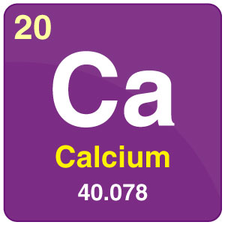Calcium
Calcium is the twentieth element in the Idiotic Table, and is a form of metal that can be found in the earth's crust. Down there, it is the fifth most popular metal, putting it very high on the leaderboard for most famous metals.
Its appearance resembles a crinkly old tissue that has been up your nan's sleeve for six years, and has a dull grey colour with a little tinge of yellow thrown in there for the meme. It is known for being stronger than even lead, showing that you don't have to have a high atomic number to be hard as nails.
Health benefits
One of calcium's best-known abilities is to subtly strengthen the bones of anyone who consumes it, upping their defence and attack speed. Calcium can often give this boost if it is in some sort of food or drink, for example milk and cheese, but can also be found in things like pig faeces and Flintstones gummies.
If you were to eat calcium raw, however, you would die. This is because calcium is a metal, and you can't just straight up eat metal. If you did eat metal, what would likely happen is if it was to enter your intestines, it would make a hole in it, and chances are that after that, you'd just keel over and die. So don't do it unless you want to die.
Skeletons
Skeletons are primarily composed of calcium, and are one of the reasons why calcium can pose a severe threat to society. Skeletons can be grown by firmly burying calcium in four feet's worth of a mixture of dirt and faeces, and watering it every five days until a skull pops up out of the ground (usually after three months). When that happens, one pulls the skull out of the ground, and then tries not to die to their newlygrown skeleton.
Skeletons are heavily attracted to calcium, due to the fact that it's what makes them stronger. Since a skeleton is always inside someone, one should stay away from all sources of calcium as, when one is buried after dying, their skeleton will pop right out and start a killing spree — which wouldn't be very pleasant if it was with fireballs. For this reason, it is advised to be cremated after death, as it slows the rate at which the skeleton will emerge. However, it does not guarantee that the skeleton will stay trapped.
| H | | He | |||||||||||||||
| Li | Be | | B | C | N | O | F | Ne | |||||||||
| Na | Mg | | Al | Si | P | S | Cl | Ar | |||||||||
| K | Ca | Sc | Ti | V | Cr | Mn | Fe | Co | Ni | Cu | Zn | Ga | Ge | As | Se | Br | Kr |
| Rb | Sr | Y | Zr | Nb | Mo | Tc | Ru | Rh | Pd | Ag | Cd | In | Sn | Sb | Te | I | Xe |
| Cs | Ba | Lu | Hf | Ta | W | Re | Os | Ir | Pt | Au | Hg | Tl | Pb | Bi | Po | At | Rn |
| Fr | Ra | Lr | Rf | Db | Sg | Bh | Hs | Mt | Ds | Rg | Cn | Nh | Fl | Mc | Lm | Ts | Og |
| | |||||||||||||||||
| La | Ce | Pr | Nd | Pm | Sm | Eu | Gd | Tb | Dy | Ho | Er | Tm | Yb | ||||
| Ac | Th | Pa | U | Np | Pu | Am | Cm | Bk | Cf | Es | Fm | Md | No | ||||
| Featured version: 12 August 2024 | |
| This article has been featured on the main page. — You can vote for or nominate your favourite articles at Uncyclopedia:VFH. | |


